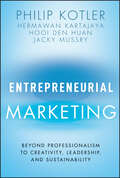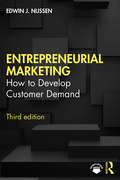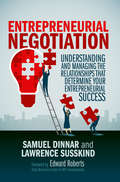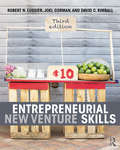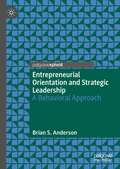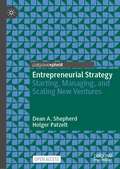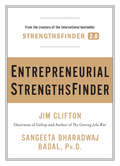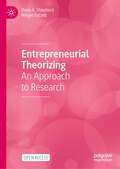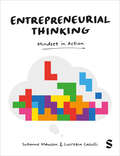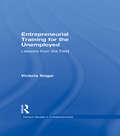- Table View
- List View
Entrepreneurial Marketing: An Effectual Approach
by Edwin J. NijssenHow do you sell an innovative product to a market that does not yet exist? Entrepreneurial businesses often create products and services based on radically new technology that have the power to change the marketplace. Existing market research data will be largely irrelevant in these cases, making sales and marketing of innovative new products especially challenging to entrepreneurs. Entrepreneurial Marketing focuses on this challenge. Classic core marketing concepts, such as segmentation, positioning and the marketing mix undergo an ‘extreme makeover’ in the context of innovative products hitting the market. Edwin J. Nijssen stresses principles of affordable loss, experimentation and adjustment for emerging opportunities, as well as cooperation with first customers. Containing many marketing examples of successful and cutting edge innovations (including links to websites and videos on the Internet), useful lists of key issues and instructions on how to make a one-page marketing plan, Entrepreneurial Marketing: An Effectual Approach provides a vital guide to successfully developing customer demand and a market for innovative new products. This second edition has been thoroughly expanded with: a one-page marketing plan which now focuses on the three entrepreneurial challenges that can be easily adapted; coverage of the customer development process; and updated references and new examples. This book provides students and entrepreneurs with the fundamental tools to succeed in marketing.
Entrepreneurial Marketing: Beyond Professionalism to Creativity, Leadership, and Sustainability
by Philip Kotler Hermawan Kartajaya Hooi Den Huan Jacky MussryAn eye-opening discussion of the future of marketing, from four of the leading minds in the field In Entrepreneurial Marketing: Beyond Professional Marketing, a renowned team of marketing leaders, including the “Father of Modern Marketing,” Professor Philip Kotler, delivers a groundbreaking and incisive redefinition of entrepreneurial marketing. In the book, some of the marketing sector’s brightest minds explore the increasingly essential initiative to build new capabilities beyond the mainstream marketing approach that also consider the effect of digital connectivity on consumers and companies everywhere. This book also discusses what marketers need to do to break the stagnation of normative marketing approaches that are often no longer effective in dealing with dynamic business environments. The authors introduce a fresh entrepreneurial marketing approach, converging dichotomies into a coherent form. The book also includes: A post-entrepreneurial-marketing view of the commercial landscape which puts the operational aspect at the center of the action, converging marketing and finance, and adopting technology for humanity Discussions of the strategies and techniques that will drive the actions of the marketing departments to create value with values that will lead the company to success through the year 2030 Explorations of the paradox between the development of core competencies and collaboration with various parties, including competitorsThe latest publication from some of the foremost minds in marketing—and in business, generally—Entrepreneurial Marketing: Beyond Professional Marketing is a must-read combination of unique insight, concrete advice, and implementable strategies that introduce a new mindset for every professional marketer, entrepreneur, and business leaders worldwide.
Entrepreneurial Marketing: How to Develop Customer Demand
by Edwin J. NijssenHow do you sell an innovative product to a market that does not yet exist? Entrepreneurial businesses often create products and services based on radically new technology that have the power to change the marketplace. Existing market research data will be largely irrelevant in these cases, making sales and marketing of innovative new products especially challenging to entrepreneurs. Entrepreneurial Marketing focuses on this challenge. Classic core marketing concepts, such as segmentation, positioning, and the marketing mix undergo an ‘extreme makeover’ in the context of innovative products hitting the market. Edwin J. Nijssen stresses principles of affordable loss, experimentation, and adjustment for emerging opportunities, as well as cooperation with first customers. Containing many marketing examples of successful and cutting-edge innovations (including links to websites and videos), useful lists of key issues, and instructions on how to make a one-page marketing plan, Entrepreneurial Marketing provides a vital guide to successfully developing customer demand and a market for innovative new products. This third edition has been thoroughly expanded, including: Expanded content on leveraging digital technologies and their new business models More practical tools, such as coverage of the Lean Canvas model Updated references, cases, and new examples throughout; and, Updated online resources This book equips advanced undergraduate and postgraduate students of marketing strategy, entrepreneurial marketing, and entrepreneurship with the fundamental tools to succeed in marketing.
Entrepreneurial Marketing: Learning from High-Potential Ventures
by Joseph B. LassiterDescribes entrepreneurial marketing as both a mind-set and a process. Draws on some 30 business field cases and some 300 student projects that provide insight into what managers do in high-potential settings.
Entrepreneurial Motivations: Strategies, Opportunities and Decisions (International Studies in Entrepreneurship #57)
by Marco ValeriEntrepreneurship depends on the decisions that people make about how to undertake that process; however, in recent years, entrepreneurship research has focused largely on the environmental characteristics influencing firm founding and the characteristics of entrepreneurial opportunities, ignoring the role of human agency. This book, therefore, focuses on how human motivations influence the entrepreneurial process. It argues that the attributes of people making decisions about the entrepreneurial process influence the decisions that they make. The book particularly investigates whether entrepreneurial role models, social valuation of entrepreneurship, perceived knowledge of entrepreneurial support and barriers to starting a business, entrepreneurial intention, and its determinants are related to entrepreneurial motivation.Featuring case studies that analyze the motivations that researchers have suggested should influence the entrepreneurial process, this book is beneficial to students, scholars, and practitioners in entrepreneurship.
Entrepreneurial Negotiation: Understanding And Managing The Relationships That Determine Your Entrepreneurial Success
by Lawrence Susskind Samuel Dinnar Edward RobertsThe great majority of startups fail, and most entrepreneurs who have succeeded have had to bounce back from serious mistakes. Entrepreneurs fumble key interactions because they don’t know how to handle the negotiation challenges that almost always arise. They mistakenly believe that deals are about money when they are much more complicated than that.This book presents entrepreneurship as a series of interactions between founders, partners, potential partners, investors and others at various stages of the entrepreneurial process - from seed to exit. There are plenty of authors offering ‘tips’ on how to succeed as an entrepreneur, but no one else scrutinizes the negotiation mistakes that successful entrepreneurs talk about with the authors.As Dinnar and Susskind show, learning to handle emotions, manage uncertainty, cope with technical complexity and build long-term relationships are equally or even more important. This book spotlights eight big mistakes that entrepreneurs often make and shows how most can be prevented with some forethought. It includes interviews with high-profile entrepreneurs about their own mistakes. It also covers gender biases, cultural challenges, and when to employ agents to negotiate on your behalf.Aspiring and experienced entrepreneurs should pay attention to the negotiation errors that even the most successful entrepreneurs commonly make.
Entrepreneurial New Venture Skills
by Robert N. Lussier Joel Corman David KimballAs business schools expand their entrepreneurship programs and organizations seek people with entrepreneurial skills, it has become clear that the skills and mindset of an entrepreneur are highly valued in all business contexts. This latest edition of Entrepreneurial New Venture Skills continues to focus on helping students develop entrepreneurial skills, whether they seek to become entrepreneurs or employees. Focusing on the entrepreneurial start-up process, the third edition of Entrepreneurial New Venture Skills takes the reader through the steps of selecting, planning, financing, and controlling the new venture. The authors cover multiple forms of new ventures, as well as ways to utilize entrepreneurial skills in other contexts, encouraging students to engage with the material and apply it to their lives in ways that make sense for them. Skill development features include: Entrepreneurial profiles of small business owners Personal applications for students to apply questions to their new venture or a current business Global and domestic cases Elevator pitch assignments, which put students in the venture capitalist position Application exercises and situations covering specific text concepts Business plan prompts to help students construct a business plan over the course of a semester Featuring pedagogical tools like review questions and learning outcomes, and a full companion website that expands upon skill development and offers instructor resources, the third edition of Entrepreneurial New Venture Skills is the perfect resource for instructors and students of entrepreneurship.
Entrepreneurial Opportunity: The Right Place at the Right Time
by Greg ClydesdaleSuccessfully starting a new business venture depends upon more than having a brilliant idea, getting funding, and getting the product or service to market. Entrepreneurs must also learn to read the market and understand the environments in which they must operate. Entrepreneurial Opportunity places the emphasis on reading and making the most of things that may be beyond the entrepreneur’s control, from defaulting contractors to the opening and closing of business niches. It also considers previously under-considered options, such as "the political entrepreneur." This long over-due text provides a far more realistic view of entrepreneurial opportunity and the importance of the business environment. Yet despite its realist stance, the book is decidedly optimistic, showing readers how markets evolve over time and present opportunities through that evolution. As Clydesdale states, "it’s not always fair out there," but this book captures the excitement of the market and its role in delivering opportunities. Drawing on a broad range of academic research, Entrepreneurial Opportunity is written in a manner that is accessible for students and practitioners, with examples and mini-cases from a variety of industries, including high technology, hospitality, and motion pictures.
Entrepreneurial Orientation and Strategic Leadership: A Behavioral Approach
by Brian S. AndersonThis book sits at the intersection of two lines of inquiry of critical importance to management researchers—what are the contributory factors to building an entrepreneurial company, and what is senior leadership’s role in this process? Inherently cross-disciplinary, it adopts a behavioral perspective and proposes a research model delineating how various strategic leadership variables influence a firm’s exhibition of entrepreneurial behaviors, captured by the entrepreneurial orientation (EO) construct.While EO research touches briefly on the role of the CEO senior leadership consideration, the field lacks an integrated perspective on how senior leadership decisions enable or constrain EO. To address this gap, the author proposes resource allocation decisions as the central mechanism through which a set of strategic leadership variables causally influence EO. He argues for the superiority of a behavioral view of EO and of strategic leadership, which stands in contrast to the attitudinal perspective on EO and the ex officio perspective on strategic leadership.Opening a rich new stream of inquiry on leadership antecedents to EO, this work will appeal to both entrepreneurship and leadership researchers, unpacking both research gaps and research questions concerning the role of the CEO and top management team, corporate boards, and emerging leadership challenges.
Entrepreneurial Profiles of Creative Destruction: Courage, Imagination And Creativity In Action
by Don Stewart Elias G. Carayannis Caroline Sipp Thanos VenierisEntrepreneurial Profiles is intended to help students and practitioners of entrepreneurship think about what it takes to create a significant business, with focus on what it may take to create a successful and significant business.
Entrepreneurial Renaissance
by Piero FormicaThis book explores the parallels between the Renaissance during the 14th to 16th centuries and the upheavals in human and physical sciences in the 21st Century that herald an insurgent entrepreneurial renaissance. The first Renaissance, conceived and developed in an urban environment, with the Medici family in Florence as pioneers, was a melting pot of art, culture, science and technology. It is in that context that entrepreneurship derived from artisan tradition and, hence, customized, was born to meet the demands and anticipate the needs of individual consumers. Starting with the mechanical technologies of the first industrial revolution, art, culture and science became separated from entrepreneurship. The latter took on Fordist features which depersonalized and, therefore, standardized the producer-consumer relationship. The emerging model of entrepreneurship returns to its origins in customization (e. g. , 3D printing technologies, sharing/on-demand economy) strongly linked to the sequence "art-culture-science-technology. " The road to a new entrepreneurial renaissance is traveled by cities with creative communities. These communities actively participate in promoting international talent mobility, encouraging connections among the knowledge nomads who move around the world and the resources and talents rooted locally. Brought back to life under the conditions of the current age, entrepreneurship is once again woven into the fabric of art, culture, science and technology, and contributing to civic identity and pride. Featuring case studies from local experts that highlight innovative initiatives and developments in diverse cities around the world, this book aims to stimulate deep thought, theories and applications in the fields of entrepreneurship and innovation.
Entrepreneurial Responses to Chronic Adversity: The Bright, the Dark, and the in Between
by Dean A. Shepherd Vinit Parida Joakim WincentThis open acess book extends recent work on entrepreneurship in response to adverse events to explore entrepreneurial responses by people who face chronic adversity more deeply. Instead of focusing on the sort of responses intended to destroy the institutions that create and sustain chronic adversity, the authors are interested in how individuals use entrepreneurial action to find a way within these adverse constraints to improve their lives. They explore the positive outcomes arising from these entrepreneurial actions for the entrepreneurial actor and their family members as well as the negative consequences of these entrepreneurial responses to chronic adversity—outcomes that diminish others’ well-being. The book relies on the lived experiences of those facing chronic adversity to provide insights into the bright—and dark—sides of entrepreneurship and the complexity of these relationships. It will serve as a valuable resource to scholars seeking to understand how entrepreneurial action is conceived and implemented by those facing challenging resource-poor environments.
Entrepreneurial Sales and Marketing Vignettes
by Frank V. Cespedes Mark RobergeWhich sales candidate is a startup's ideal first hire? What marketing channels are best to invest in? How aggressively should an executive team align sales with customer success? Early stage founders, sales leaders, and marketing executives often face one, and sometimes all, of the above scenarios as they grow their ventures. This case presents three short vignettes, with three fictitious organizations, to facilitate a discussion around these important decisions.
Entrepreneurial Seoulite: Culture and Subjectivity in Hongdae, Seoul (Perspectives On Contemporary Korea)
by Mihye ChoEntrepreneurial Seoulite might be read as a memoir on Hongdae based on the author’s observations as a member of South Korea’s Generation X. During the 1990’s, Hongdae became widely known as a cool place associated with discourses on alternative music, independent labels, and club culture. Today, Hongdae is well known for its youth culture and nightlife, as well as its gentrification. Recent research on Korean culture approaches the K-wave phenomenon from the perspectives of cultural consumption, media analysis, and cultural management and policy. Meanwhile, studies on Seoul have centered on its transformation as a global, creative city. Rather than examining the K-wave or the city itself, this book explores the experience of living through the city-in-transition, focusing on the relationship between “the ideology that justified engagement in capitalism” and the “subjectification process.” The book aims to understand the project to institutionalize a cultural district in Hongdae as a demonstration of the coevolution of ideologies and citizenship in a society undergoing rapid liberalization—politically, culturally, and economically. A cultural turn took place in Korea during the 1990s, amid the economic prosperity driven by state-led industrialization and the collapse of the military dictatorship due to democratization movements. Cultural critiques, emerging as an alternative to social movements, proliferated to assert the freedom and autonomy of individuals against regulatory systems and institutions. The nation was hit by the Asian financial crisis in 1997, and witnessed massive economic restructuring including layoffs, stakeouts, and a prevalence of contingent employment. As a result, the entire nation had to find new engines of economic growth while experiencing a creative destruction. At the center of this national transformation, Seoul has sought to recreate itself from a mega city to a global city, equipped with cutting-edge knowledge industries and infrastructures. By juxtaposing the cultural turn and cultural/creative city-making, Entrepreneurial Seoulite interrogates the formation of new citizen subjectivity, namely the enterprising self, in post-Fordist Seoul. What kinds of logic guide individuals in the engagement of new urban realities in rapidly liberalized Seoul—culturally and economically? In order to explore this query, Mihye Cho draws on Weber’s concept of “the spirit of capitalism” on the formation of a new economic agency focusing on the re-configuration of meanings, and seeks to capture a transformative moment detailing when and how capitalism requests a different spirit and lifestyle of its participants. Likewise, this book approaches the enterprising self as the new spirit of post-Fordist Seoul and explores the ways in which people in Seoul internalize and negotiate this new enterprising self.
Entrepreneurial Small Business
by Jerome A. Katz Green Richard PEntrepreneurial Small Business (ESB) focuses on traditional “main street” businesses versus high-growth firms dependent on venture capital. It presents the realities small business owners face and strategies for those starting or maintaining a small business. ESB combines the art of small business survival with the science of small business success, to provide students the tools and knowledge they need to go out and start their own small businesses. ESB features practical advice and experiential learning. Informed by nearly 180 journals in entrepreneurship, the authors make the best of modern wisdom easy to understand and easy to apply. With one of the largest collections of experiential learning techniques, ESB gives students the hands-on experience they need to start their small business with over 100 end-of-chapter experiential exercises, 59 skill modules, mini-cases, business model canvases and business plans.
Entrepreneurial Small Business
by Jerome Katz Richard P. GreenEntrepreneurial Small Business (ESB) provides students with a clear vision of small business as it is today. ESB focuses on the distinctive nature of small businesses that students might actually start versus high growth firms. The authors of ESB incorporate the latest findings and best practices from academic and consulting arenas, and recognize the distinction between entrepreneurs who aim to start the successor to Amazon.com or the pizza place around the corner. Entrepreneurial Small Business focuses on the small businesses students might actually start.
Entrepreneurial Strategy: Starting, Managing, and Scaling New Ventures
by Dean A. Shepherd Holger PatzeltThis open access book focuses on explaining differences amongst organizations regarding various attributes, forms, and outcomes. By focusing on the “how” of new venture creation and management to produce well-established organizations, the authors aim to increase our understanding of the antecedents of most management research assumptions. New ventures are the source of most newly created jobs generated in an economy, new industries and markets, innovative products and services, and new solutions to economic, social, and environmental problems. However, most management research assumes a well-established organization as the starting point of their theorizing.Building on the notion of guided attention, it details how entrepreneurs can allocate their transient attention to identify potential opportunities from environmental change and how entrepreneurs allocate their sustained attention to form beliefs about radical and incremental opportunities requiring entrepreneurial action. The authors explain how entrepreneurs build such communities and engage community members over time to co-construct potential opportunities for new venture progress. Using the lean startup framework, they connect the dots between the theorizing on identifying and co-constructing potential opportunities and the startup of new ventures. This leads to a new overarching framework based on are (1) co-creating a startup, (2) organizing a startup, and (3) performing a startup to bring together the many disparate threads of research on new ventures. The authors then theorize on the importance of knowledge in organizational scaling. Based on cutting-edge research from the leading entrepreneurship journals, this book expands knowledge on the cognitive aspect of the new venture creation process.
Entrepreneurial StrengthsFinder
by Jim Clifton Sangeeta Bharadwaj BadalEntrepreneurial StrengthsFinder delves into the psychology of the entrepreneur. Gallup research shows that decisions and actions, influenced by the personality of the entrepreneur, impact the survival and growth of the venture.Entrepreneurial StrengthsFinder is about understanding what drives entrepreneurs to start, sustain, and grow a successful company. What are the personality characteristics and behaviors that lead to venture creation and success? Can one learn to be an entrepreneur, or are you born with it? The book attempts to answer these questions with the hope that if you are planning to start a business or are managing one, you can discover your entrepreneurial talents and in the process, increase your potential to start or grow your venture.Written in an engaging, conversational style, Entrepreneurial StrengthsFinder includes strategies and action items for building successful ventures. It also features an online test that measures readers' entrepreneurial potential.Entrepreneurial StrengthsFinder is meant for several audiences - from those who are planning to start or grow a business to investors and coaches who can help identify talent and then foster and support that talent to start or grow a business.
Entrepreneurial Teams as Determinants of of New Venture Performance (Garland Studies in Entrepreneurship)
by Michael D. EnsleyFirst Published in 1999. Routledge is an imprint of Taylor & Francis, an informa company.
Entrepreneurial Theorizing: An Approach to Research
by Dean A. Shepherd Holger PatzeltThis open access book investigates an entrepreneurial approach to building new theories. It provides a rich understanding of how specific tools facilitate aspects of the theorizing process and offers a clearer big picture of the process of building important new entrepreneurship theories. The authors show that anthropomorphizing has been a critically important tool for developing influential entrepreneurship theories. They reveal how scholars build on their rich and highly accessible understanding of humans (i.e., the self and others) to make guesses and sense of entrepreneurial anomalies, articulate theoretical mechanisms to build more robust entrepreneurship theories, and create plausible stories that facilitate sensegiving. Further, they offer a framework that guides entrepreneurship scholars in finding a balance to maximize their contributions and guides reviewers and editors in managing the revise-and-resubmit process to advance the entrepreneurship field. Finally, they present lean scholarship as an approach to developing a portfolio of high-quality, high-impact papers. Lean scholarship starts with an entrepreneurial mindset and involves creating a minimum viable paper, exploring its validity, adding a plausible paper to one’s portfolio, and managing the portfolio by periodically deciding whether to persevere, pivot, or terminate each paper. This seminal work will appeal to entrepreneurship researchers, both those new to the field as well as seasoned veterans, who want to learn more about the tools that can be used to generate new knowledge about new ventures and other entrepreneurship topics.
Entrepreneurial Thinking: Mindset in Action
by Suzanne Mawson Lucrezia CasulliEntrepreneurship is not just about building businesses: it encompasses a set of skills, competencies and linked behaviours to support the creation of new ideas to create value. Entrepreneurial thinking is relevant across all aspects of life, personal and professional, and closely linked to both employability and life skills. This new textbook, via an array of pedagogical features, quizzes and worksheets, guides you in developing your own entrepreneurial thinking skills to support the development of ideas to tackle problems and challenges for yourself, for organisations and for society generally. It will challenge you to look beyond standard narratives of ‘heroic’ entrepreneurial individuals to identify how you yourself can become a creator of value in our volatile, uncertain, complex and ambiguous world. Suzanne Mawson is an Associate Professor of Entrepreneurship at the University of Strathclyde Business School. Lucrezia Casulli is an Associate Professor of Entrepreneurship at the University of Strathclyde Business School.
Entrepreneurial Thinking: Mindset in Action
by Suzanne Mawson Lucrezia CasulliEntrepreneurship is not just about building businesses: it encompasses a set of skills, competencies and linked behaviours to support the creation of new ideas to create value. Entrepreneurial thinking is relevant across all aspects of life, personal and professional, and closely linked to both employability and life skills. This new textbook, via an array of pedagogical features, quizzes and worksheets, guides you in developing your own entrepreneurial thinking skills to support the development of ideas to tackle problems and challenges for yourself, for organisations and for society generally. It will challenge you to look beyond standard narratives of ‘heroic’ entrepreneurial individuals to identify how you yourself can become a creator of value in our volatile, uncertain, complex and ambiguous world. Suzanne Mawson is an Associate Professor of Entrepreneurship at the University of Strathclyde Business School. Lucrezia Casulli is an Associate Professor of Entrepreneurship at the University of Strathclyde Business School.
Entrepreneurial Training for the Unemployed: Lessons from the Field (Garland Studies in Entrepreneurship)
by Victoria SingerFirst Published in 1999. Routledge is an imprint of Taylor & Francis, an informa company.
Entrepreneurial Universities
by Marta Peris-Ortiz José M. Merigó-Lindahl Carlos Rueda-Armengot Jaime Alonso GómezThis book analyses the importance of the entrepreneurial university, specifically in relation to the creation of entrepreneurial ideas and attitudes in students and entrepreneurial initiatives in academic institutions. The aim of the editors and contributing authors is to provide the reader with a set of experiences illustrating the advantages of communicating and encouraging entrepreneurship among students, thereby highlighting the "third mission" of the university: the need to adopt entrepreneurial strategy without disrupting the quality of teaching and research. Featuring initiatives from institutions around the world, the authors argue that the increasing importance of knowledge in the technical and social dimensions of today's world provides greater relevance to the entrepreneurial university. In this context, universities transcend their traditional focus on teaching and basic research to carry out technology transfers, marketing ideas, and patent registrations, and incorporate spin-off companies that contribute to industrial innovations, economic growth, and job creation. In the teaching dimension, the entrepreneurial university represents a focus on programs which train students in the applications and most advanced practices in knowledge-driven fields. The book addresses such questions as: Can marketing ideas deteriorate the quality of research in the long term? What importance does the cultural framework have for an entrepreneurial education? What circumstances and programs facilitate spin-offs in universities What are the key features of entrepreneurial universities? In reference to entrepreneurship education in its broadest sense, then, it corresponds to the framework of ideas and general features on which entrepreneurship is founded: in-depth knowledge of the projects or ventures which they wish to carry out, capacity to perceive the relevant characteristics of the environment, and the leadership and goal setting skills to achieve success.
Entrepreneurial Universities: Creating Institutional Innovation in Times of Turbulence
by Surja Datta Sola AdesolaThis book explores the idea of the ‘Entrepreneurial University’ within the institutional environment that focuses on the production, dissemination, and exploitation of knowledge. Keeping its gaze firmly on the constitutive elements of the knowledge-based institutional environment – the key actors and their interactions – the book makes important theoretical and empirical contributions to the burgeoning literature on academic entrepreneurship. The contributing chapters in the book draw insights from a range of disciplines including history, institutional and evolutionary economics, strategic management, entrepreneurship, and innovation studies to explore how institutions can create new business opportunities in turbulent times. This interdisciplinary approach has generated a rich and diverse set of insights on the idea of Entrepreneurial Universities for students, researchers, practitioners and policymakers interested in innovation and technology studies, entrepreneurship, and knowledge management.

